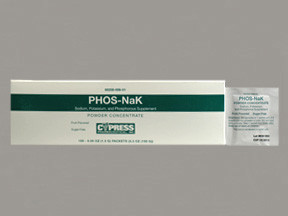SODIUM/POTASSIUM PHOSPHATE, MONOBASIC-DIBASIC POWDER - ORAL
PHONETIC PRONUNCIATION: (SOE-de-um/poe-TAS-ee-um FOS-fate, MON-oh-BAY-sik,dye-BAY-sik)
COMMON BRAND NAME(S): Neutra-Phos
GENERIC NAME(S): sodium phosphate/potassium phosphates, monobasic and bibasic
Uses
USES: This drug is used in people who cannot get enough phosphorus from their diets. Phosphorus is a natural body mineral that is needed for the body to work normally. It is needed for building and keeping strong bones. It also helps control the amount of calcium in the body and urine.
How to use SODIUM/POTASSIUM PHOSPHATE, MONOBASIC-DIBASIC POWDER - ORAL
HOW TO USE: Open the packet and mix the powder in one-third of a glass (2.5 ounces or 75 milliliters) of water or other liquid such as juice. Stir the mixture well before taking all of it. Take this medication by mouth, usually 4 times a day with meals and at bedtime or as directed by your doctor. Dosage is based on your medical condition and response to treatment. Take this medication regularly in order to get the most benefit from it. To help you remember, take it at the same times each day. Take this medication 2 to 3 hours before or after taking any products containing magnesium, aluminum, or calcium. Some examples include quinapril, didanosine, vitamins/minerals, and antacids. Dairy products (e.g., milk, yogurt), calcium-enriched juice, iron, and zinc are also included. These products bind with phosphate, preventing its full absorption. If your doctor has recommended that you follow a special diet, it is very important to follow the diet to get the most benefit from this medication and prevent serious side effects. Do not take other supplements/vitamins unless ordered by your doctor. If you are unsure about how to take this medication, ask your doctor or pharmacist.
Side Effects
Precautions
Interactions
Overdose
Images
Reviews
Disclaimer
IMPORTANT: HOW TO USE THIS INFORMATION: This is a summary and does NOT have all possible information about this product. This information does not assure that this product is safe, effective, or appropriate for you. This information is not individual medical advice and does not substitute for the advice of your health care professional. Always ask your health care professional for complete information about this product and your specific health needs.


No Reviews Yet